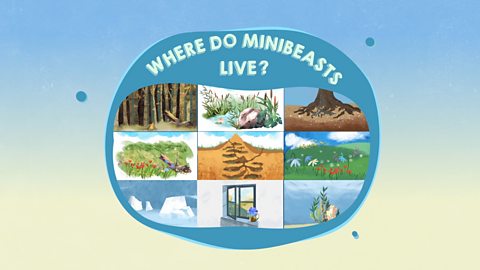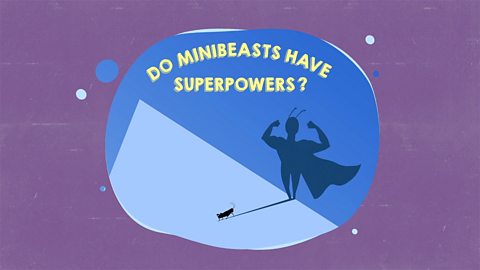Connie:What is a minibeast?
Maddie Moate:Hello everyone!
Children:Shhh!
Maddie Moate:What are you doing?
Connie:We're looking for minibeasts!
Jack:We have to be quiet so we don't scare scare them away.
Maddie Moate:That's a fun idea but what exactly are minibeasts? All animals inthe world fit into six different groups: Mammals, Birds, Reptiles,Amphibians, Fish and Invertebrates. Each group is defined byspecial characteristics for example, birds lay eggs, reptiles areare cold-blooded, and fish breathe underwater. Minibeasts aresmall invertebrates which means they have no back-bone insidetheir bodies, so some can be soft and bendy - like this worm! Butnot all minibeasts are like this. Their soft bodies can make themvulnerable, so lots of minibeasts have a hard outer body called anexoskeleton that covers and protects them. It's a bit like a suit ofarmour. Let's meet some of these marvellous minibeasts. This isCraig, the Madagascan Hissing Cockroach, with his handler. Inthe wild, Madagascan Hissing Cockroaches live in Madagascar.
Jack:His body feels very smooth!
Maddie Moate:That is Craig's hard exoskeleton. He has no bones inside hisbody, so he needs this outer shell to help protect him. He makes ahissing sound to communicate with other cockroaches.
Connie:What about Speedy? He's an African Giant Land Snail.
Maddie Moate:Snails like Speedy from Eastern Africa and the garden snails youwould see in the UK have a different kind of exoskeleton, they'reable to protect their soft bodies by curling up inside their shells!
Jack:So he carries his house around with with him? I definitelycouldn't carry my house around on my back!
Maisie:He looks very slimey!
Maddie:Snails are covered in a slime called mucus, this helps them tomove, stick to surfaces like walls, and stops them from dryingout. Let's wash our hands after handling these minibeasts. Didyou know that minibeasts are some of the oldest species onearth? Grasshoppers existed before the dinosaurs, more thanthan 200 million years ago. Today Invertebrates and minibeastsare by far the largest group in the animal animal kingdom: 97percent of all animals are invertebrates. Lots of minibeasts areable to fly, like this dragonfly. They have wings to escapepredators and to find shelter, and new sources of food and water.Minibeasts can look very different and can be all shapes andcolours. Some live on their own and some live in large groups orcolonies. They can be beautiful colours, like this butterfly, andsome blend into their surroundings, like this peppered moth.Some minibeasts are very fast like this spider, or some, like thisslug, are very slow. Certain minibeasts can even live under water.The world has such a diverse variety of minibeasts! Let's hearmore about minibeast characteristics from our expert!
Yussef:Hi I'm Yussef and I'm a minibeast expert, and these littleminibeasts are called Sun Beetles. Sun Beetles are a type ofinsect, and there's a few different things to look out for. First ofall, all insects have six legs, and they also have two antennae onthe top of their heads that help them to feel their way around.Sun Beetles have a hard outer shell to keep themselvesprotected, but under this shell is a pair of soft wings that theycan use to fly. And these guys are vegetarian and they love to eatfruit, but there are some insects that will eat other insects, andthere are even some insects that like to eat animal poo.
Maddie Moate:What are you doing?
Connie:We're building our own minibeasts from recycled materials.
Maddie Moate:That looks like fun! What minibeast characteristics are youincluding?
Jack:Mine has a plastic bottle as an exoskeleton.
Maisie:Look at my snail's cardboard shell!
Connie:I've used bright colours for my butterfly.
Maddie Moate:Fantastic!
Video summary
A group of children embark on a quest to discover the fascinating world of minibeasts.
Through hands-on exploration and expert guidance, they learn about the diverse characteristics and habitats of these small invertebrates, from slimy snails to speedy spiders.
Teacher notes
Discussion points:
1. Introduction to minibeasts:
- Define minibeasts as small invertebrates ÔÇô animals without a backbone.
- Discuss the six main groups of animals and explain where minibeasts fit in.
- Ask ÔÇô ÔÇÿWhat are minibeasts, and how are they different from other animals?ÔÇÖ
2. Characteristics of minibeasts:
- Explore the unique features of minibeasts, such as their soft bodies and hard exoskeletons.
- Highlight examples of different minibeasts and some of the ways they are adapted to their environment.
- Ask ÔÇô ÔÇÿHow do minibeasts protect themselves from predators?ÔÇÖ
3. Minibeast diversity:
- Discuss the wide variety of minibeasts found in different habitats and environments.
- Encourage children to observe minibeasts in their surroundings and appreciate their diversity.
- Ask ÔÇô ÔÇÿCan you name different types of minibeasts and describe their habitats?ÔÇÖ
Suggested activities:
1. Invertebrate sorting game:
- Provide pictures of various animals and ask children to sort them into vertebrates and invertebrates.
2. Invertebrate Art/DT project:
- Encourage children to create artwork featuring their favourite invertebrates using recycled materials.
- Encourage discussions about the characteristics and adaptations they include in their creations.
- Introduce coding concepts by making the creations move using simple coding with the ┤¾¤¾┤½├¢ Micro:bit.
3. Invertebrate observation:
- Invite children to explore their outdoor environment and observe minibeasts like ants or butterflies.
- Encourage the creation of bug hotels or habitat boxes in design and technology classes to provide homes for minibeasts.
Curriculum notes:
This video supports learning objectives related to science in KS1 within the national curriculums of England and Northern Ireland, and 1st Level in Scotland.
Where do minibeasts live? video
Children learn about the diverse habitats that support minibeast communities around the world.

Do minibeasts have superpowers? video
Children discover how minibeasts use their extraordinary abilities for various purposes, from helping humans to defending themselves against predators.
